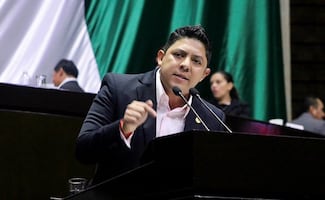Más Información

En SLP nunca ha existido una gobernadora y ahora hay una posibilidad real que así sea, asegura Ricardo Gallardo tras aprobación de "Ley Esposa"

Morena analiza disminución de pluris y elección popular de consejeros del INE: Monreal; serán revisadas en la reforma electoral, dice

Rastro de jets vinculados al narcotráfico lleva a un vendedor en California… y a un punto ciego de la regulación aérea en Estados Unidos

Secretaría Anticorrupción sanciona a dos empresas por buscar contratos con información falsa; imponen multa de miles de pesos

Banxico se despide de 2025 con otro recorte a la tasa de interés; queda en 7% por ajuste de 25 puntos base
A little more than a million people in the country do not have a Mexican birth certificate , according to a document on the “Right to an identity. The coverage of birth registration in Mexico,” provided by the National Institute of Statistics and Geography and UNICEF-Mexico .
The document provides detailed information on the population segments that have a Mexican birth certificate, as well as the behavior of birth registry in the country.
During a press conference led by Julio A. Santaella, head of the INEGI ; Christian Skoog, a representative of UNICEF in Mexico, and Jorge Wheatly, the director of the National Population Registry (RENAPO) , it was reported that those without a birth certificate were deprived of their natural right to an identity.
“ When a boy or a girl is not registered, and thus has no birth certificate, he or she cannot access other rights such as the right to protection, health, or education, nor the same development opportunities as other children . The birth certificate is still one of the main requirements to enrol in school and gain effective recognition of studies and qualifications. Furthermore, citizens need their birth certificate in order to access basic health and social security services,” said Christian Skoog.
Jorge Wheatly, RENAPO director, commented that the report offered a unique prospective analysis to determine locations where the implementation of permanent mobile teams would be most effective to attend those living in the country’s most remote and needy communities.
For his part, Julio A. Santaella, president of the INEGI, said that the registration of birth at the registry office represented an institutional recognition of the right to an identity. It allows children to be given a name upon birth, as well as a nationality and a family . Moreover, it gives them legal capacity and allows them to benefit from other fundamental rights.
However, out of Mexico’s total population , around 0.8% don’t have a birth certificate , which amounts to 3.702 million people , according to the 2015 Inter-Censal Population Survey ,.
45.7% of boys and girls between 0 and 60 days of age have a birth certificate
, whereas the percentage grows to 84.6% before the babies reach their first birthday and to 95.8% among children under the age of five.
The primary cause for a lack of birth certificate is the difficulty of gathering all necessary documents to complete the process (34.0%). Another cause is the cost of the legal procedure (22.0%), and third was the time that it took to complete the process (15.6%).
The survey reported 93,425 Mexican nationals born abroad who declared that they did not have a Mexican birth certificate . Out of said number, nearly 57 thousand were born in North America , mostly in the United States (55,654).
Said segment was followed by those born in Central America or the Caribbean (16.4%) , mainly in Guatemala, Honduras, and El Salvador. People born in South America who lacked civil registration in Mexico accounted for 11.1% of the total, while those born in Europe represented 7.4%.
It is estimated that six out of every 10 people without birth registration in the country are either children or teenagers (527,963 people) . At least 59,000 people between the age of 3 and 17 are not in school.
4.8% of people without birth registration are indigenous language speakers
(a little more than 43,000 people). On the other hand, 22.7% of the total consider themselves part of an indigenous community.
Nine states account for 80.1% of indigenous language speakers without a birth certificate
. Chiapas showed the highest percentage (23.2%) with more than 10 thousand people, followed by Oaxaca (14.1%), with around six thousand people, and Puebla (12.3%) with nearly five thousand people.
dm
Noticias según tus intereses
[Publicidad]
[Publicidad]









